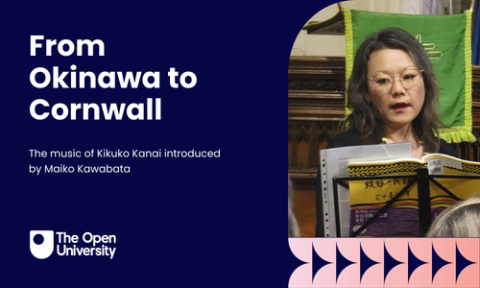From Okinawa to Cornwall: the music of Kikuko Kanai introduced by Maiko Kawabata

The Truro Sinfonia is an amateur symphony orchestra that performs a few times a year in Cornwall; lately they have taken the initiative to choose the music of women composers on their concert programmes. So when a member of the orchestra heard a piece on Radio 3 by Japanese composer Kikuko Kanai (1906-1986), one of the first Japanese women to compose Western classical music, the orchestra reached out to Open University/Royal College of Music researcher Dr. Maiko Kawabata, who has received an AHRC grant to further her research on Kanai and is currently working on the first study of the composer. The orchestra’s work with Dr Kawabata led to the performance by the Truro Sinfonia conducted by Matt Harrison of Kikuko Kanai’s symphonic poem Ryūkyū where the Deigo Flowers Blossom on 9 November 2024.
Kikuko Kanai took inspiration from the natural beauty of her native Okinawa (Ryūkyū islands) and based her works on Ryūkyū folksongs. Ryūkyū where the Deigo Flowers Blossom was composed in 1946 following the devastating Battle of Okinawa, in which the U.S. army waged war on Japan; from far away in Tokyo, she recalled her hometown and the bright red Deigo flowers blooming in the summer. Also known as Indian Coral Tree, the tropical species is designated as the official flower of Okinawa prefecture.
During a pre-concert talk, with violin in hand, Dr. Kawabata illustrated the folksongs quoted, fragmented, and developed by Kanai. The orchestra gave a spirited performance, proving that Kanai’s dream – to transport her beloved folksongs to the world on the wings of Western staff notation (as she poetically put it) – had been realised in Cornwall. The Truro Sinfonia becomes only the third orchestra – after the BBC Philharmonic and the BBC National Orchestra of Wales – to perform Kanai’s music in the UK.
To find out more about Maiko Kawabata’s research on Kanai, listen to her interview "New Thinking: Diverse Classical Music" on the BBC Arts & Ideas podcast.
Request your prospectus
![]()
Explore our qualifications and courses by requesting one of our prospectuses today.